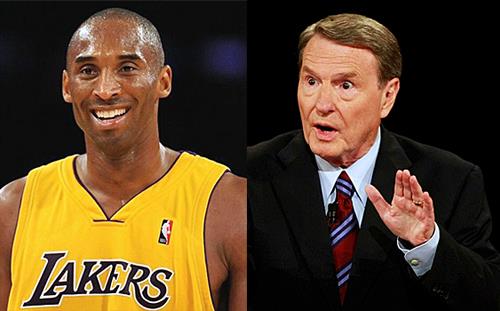
EDITOR'S NOTE: Ed Bark recalls interviewing Jim Lehrer and Kobe Bryant, both of whom we lost within the last week...
Authentically fair and balanced, newsman Jim Lehrer fought each and every inclination to be biased.
He remained undefeated during a generation-spanning career that began in print with both The Dallas Morning News and Dallas Times-Herald before TV journalism entered the picture with Lehrer's stint as anchor of KERA-TV's groundbreaking Newsroom.
I interviewed him many times during the course of a career and a life that ended last week at age 85. The man who became synonymous with public television's long-running Newshour never wavered from his belief that the public wants it straight down the middle. During an August 2008 telephone interview preceding PBS' gavel-to-gavel coverage of the Democratic and Republican national conventions, Lehrer remained convinced that the then-nascent shouting matches on CNN, Fox News Channel, and MSNBC would somehow end up being a turn-off.
"I'm very comfortable doing it the way we do it," he said. "It's the old-fashioned way, no question about it. But in time I think it's going to be seen as the new-fashioned way.
"You've first got to understand what's going on. It's that first step, the straight news step. People want someplace they can go, and people they trust. Credibility becomes increasingly important the more there is out there of blogs and iPods as well as cable television and satellite radio and all of that. There's a need to sort through the process first."
In the age of Trump, from which Lehrer was spared after retiring in 2011, cable news networks have gone "tribal" to the point of possibly no return. But Lehrer wouldn't have minded being a voice crying in the wilderness. He may well have been television's last "there" there, an unwavering voice of unimpeachable integrity and authority when it came to reporting what happened and why.
Lehrer also moderated a record 12 general election presidential debates, the last in 2012 between President Barack Obama and Republican challenger Mitt Romney. In that respect, Lehrer couldn't be taken at his word during a 2007 stop in Dallas on the occasion of his then 17th book, Eureka.
"I don't want to do any more debates," he vowed. "I've done my duty for my country. I've done 10 of these things, and they're scorching to the soul. So I'd just as soon not do anymore."
Those words were read back to him during our 2008 phone interview after Lehrer had agreed to No. 11 – between Obama and John McCain.
"You bastard!" he retorted good-naturedly. "You're never supposed to remember what anybody says. Remember what else they used to say? 'Never mind.'"
Lehrer said he changed his mind because "they asked me. I just feel that anybody who's asked to do that has to do it unless they have a damned good reason not to. And I just didn't have one. The reason I gave to you, that I've got a scorched psyche, just didn't seem good enough to me – then or now."
By that time, he had long mastered the art of self-deprecation. Many of his books have a twinkle to them. And although he could be deadly serious on the subject of straight-ahead reporting, Lehrer didn't mind knocking himself down a peg or three. Way back when, as a cub reporter for the aforementioned Morning News, he recalled screwing up an obituary by getting the deceased's name confused with the funeral director's. A stern editor didn't mince words with him, as Lehrer recalls.
"I was told, 'Little boy, the most important thing in this newspaper are the obituaries. And you'd better get the names right, or we ain't got a job for you.'"
Imagine that.
********************
My only firsthand brush with Kobe Bryant came in July 2014 during a Los Angeles press session tied to the Showtime cable network's Kobe Bryant's Muse. The documentary chronicled both his career and his rehabilitation from a serious knee injury in preparation for a 19th season with the Los Angeles Lakers. In the previous season, he had torn his Achilles tendon.
Although he never lacked confidence on or off the court, I asked Bryant whether back-to-back serious injuries had shaken him in terms of ever playing again at a high level. Or was he just "not wired to think that way?"
"No, I am," he replied. "Matter of fact, I'll tell you a story."
He was surprisingly expansive, recalling that when he was six years old, his mother thought that a karate class "would give me good discipline." He achieved white belt status before being required to spar with a kid who was a couple of years older than him and had a brown belt.
"And I remember crying my eyes out before I fought him," Bryant said. "I was, like, petrified of this guy. And my mom says, 'You know, just step in there. Just do your best. Just go after it.'
"But I was crying hysterically, like scared to shit. But I get into the ring, and I fight him, and I get my butt kicked. And I remember after, going 'Damn, that wasn't as bad as I thought it was going to be.' And the light bulb went off instantaneously. Because from that point, I always remembered that your imagination makes situations worse than they actually are. So if you can control that and look at things as realistically as possible – for what they really are – then you can come out of any situation."
Lehrer lived more than twice as long as Bryant, who shockingly died at age 41 in a helicopter crash. Both were giants in their respective realms, with their disparate imprints remaining for all to see.